|
|
|
Sort Order |
|
|
|
Items / Page
|
|
|
|
|
|
|
| Srl | Item |
| 1 |
ID:
171021
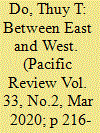

|
|
|
|
|
| Summary/Abstract |
That East Asian IR communities are increasingly interested in knowledge production has become self-evident. While the form that this interest is taken in China is predominantly focused on developing a Chinese School of International Relations Theory (IRT), the situation in Japan is much more diverse and complicated. This article examines the impact of the non-Western IRT movement on Japanese IR academia from a sociology of science perspective. It finds that while indigenous theorizing has garnered interests in a portion of Japanese IR academia due to both internal and external driving forces, there have been few claims for and actual theorizing on a ‘Japanese brand-name’ in IRT like the ‘Chinese School.’ The majority of Japanese IR scholars remain strongly attached to mainstream IRT or the traditional historical and area studies. Such development has its roots in the structural restraints embedded in Japan’s unresolved identity as a de facto polity situated between ‘East and West’ and the heritage of its war-time history. Given these characteristics of IR studies in Japan, the different components of Japanese IR academia will most likely follow their own trajectory without integration and synthesis. This will position Japanese IR, just like its current foreign policy, at a crossroads.
|
|
|
|
|
|
|
|
|
|
|
|
|
|
|
|
| 2 |
ID:
171022
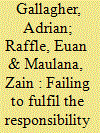

|
|
|
|
|
| Summary/Abstract |
The article provides the first substantive analysis of the war on drugs in the Philippines under the Responsibility to Protect. It develops in two stages. First, it argues that the war on drugs constitutes crimes against humanity through an analysis of, (i) extrajudicial killings and vigilante justice, (ii), dehumanisation, and, (iii) the exaggeration of threat. Second, it examines the response of the permanent five members of the UN Security Council (p5) and the Association of Southeast Asian Nations (ASEAN). Despite that the US, the UK, and France have expressed public concerns, we show that they prioritise counter-terrorism and trade over the Responsibility to Protect. Meanwhile, China and Russia uphold the view that the war on drugs is a matter of domestic jurisdiction. Regarding ASEAN, we draw on 26 semi-structured elite interviews conducted in South East Asia (2016-2018) to evidence that the elites prioritise state sovereignty and non-interference. The outcome is that there is a significant protection deficit as the government of the Philippines, the p5, and ASEAN are failing to protect those targeted in the war on drugs. We hope that the article will act as a catalyst for a much needed conversation on the international community’s political, legal, and moral responsibilities regarding mass violence against drug users in international relations.
|
|
|
|
|
|
|
|
|
|
|
|
|
|
|
|
| 3 |
ID:
171020


|
|
|
|
|
| Summary/Abstract |
The article tries to understand the dynamics of Japanese national identity and Abe Shinzo's revisionism. It argues that although Abe has launched the strongest ever attack on Japanese pacifist identity, there remain institutional and emotional constraints that prohibit this change from materializing. Theoretically, it tries to reconcile social constructivist and post-structural approaches to Japan's policy change and presses forward a sedimentation model that can explain the contemporary dynamics. Methodologically, the article builds on narrative analysis – it uncovers the revisionist narratives and shows how these interact with societal pressures. This is shown on two particular case studies: Abe's push for constitutional revision and Abe's attempt to transform school education. Within these case studies, the article shows that although Abe commands strong popular support and a hugely revisionist mindset, his societal and political changes have been rather limited.
|
|
|
|
|
|
|
|
|
|
|
|
|
|
|
|
| 4 |
ID:
171024
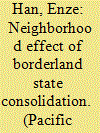

|
|
|
|
|
| Summary/Abstract |
This article examines the process of state consolidation, or its failure, in a state’s borderland area with neighboring states in upland Southeast Asia. It proposes that we should conceptualize state consolidation as an interactive process heavily influenced by a “neighborhood effect.” It argues that we should look at how state consolidation in one country’s borderland area can be influenced by the same process in the neighboring states. In particular, the article probes under what conditions the neighborhood effect of state consolidation might take place. It argues that the effect is more profound in situations where there is power asymmetry between neighboring states, and the extent of such effect is further conditioned upon the nature of relations among these states. Empirically, this article uses a set of comparative case studies Myanmar’s modern history of state consolidation in its borderland area to illustrate the proposed theoretical framework. Differentiating between the country’s eastern borders with China and Thailand vs. its western borders with Bangladesh and India, the article empirically examines Myanmar’s state consolidation processes to illustrate the theoretical framework, focusing on variations of power balance and nature of relations between the country and its neighbors since the end of World War II.
|
|
|
|
|
|
|
|
|
|
|
|
|
|
|
|
| 5 |
ID:
171025
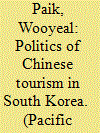

|
|
|
|
|
| Summary/Abstract |
The politics of tourism has not been studied in depth, even though many recognize the growing importance of political factors in tourism economy. As China has risen, it has used its massive volume of outbound tourists and its tourist industry for political gain, with both positive and negative consequences for partner countries. And the recipient countries’ state and society respond to these external impacts from China in various ways. In recent years, this development has alarmed students of tourism and politics in the Pacific Basin. In this context, the case of Chinese tourism in South Korea throughout 2010s sheds light on many aspects of this new and controversial phenomenon and ensuing interactions of various actors at both domestic and international political arenas.
|
|
|
|
|
|
|
|
|
|
|
|
|
|
|
|
| 6 |
ID:
171023
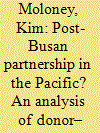

|
|
|
|
|
| Summary/Abstract |
This paper explores the possibility of a partnership between foreign aid donors and South Pacific NGOs. This partnership focus emerged out of the 2011 Busan Outcome Document. Drawing on 51 interviews of donors and Pacific-created NGOs in four countries (Fiji, Samoa, Solomon Islands, and Vanuatu), this paper finds limited donor–NGO partnership. Reasons include insufficient donor interest in a partnership, capacity and accountability concerns for Pacific NGOs, and scarce core funding. While global agreements to encourage partnership are important components of development effectiveness discussions, donor–NGO partnership is not yet possible within the Pacific context.
|
|
|
|
|
|
|
|
|
|
|
|
|
|
|
|
|
|
|
|
|